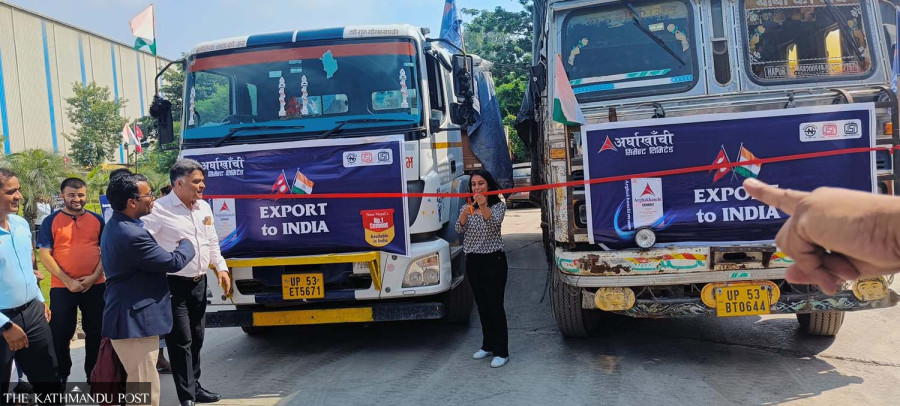Money
Cement, plywood makers secure BIS. Others still waiting
During the January IGC meeting in Kathmandu, the Indian side agreed to expedite the certification process.
Post Report
The Bureau of Indian Standards (BIS), the national standard body of India, has begun issuing certificates to cement and plywood manufacturers, a year after they applied for quality certification.
However, small footwear brands and manufacturers of sanitary pads, diapers, and some cement are still awaiting BIS certification.
An official at the Ministry of Industry, Commerce and Supplies said that the ministry has been regularly communicating with the Indian government, urging it to issue BIS certifications for Nepali manufacturers following the Nepal-India Inter-Governmental Committee (IGC) meeting in January.
The official said the ministry was unaware of which manufacturers have received certification.
Hom Prasad Ghimire, president of the Nepal Plywood Manufacturers’ Association, said that around 10 plywood factories recently received BIS certificates.
The Indian authorities began issuing the certificates in the last couple of weeks, he added.
Approximately 47 plywood factories had applied for certification. These factories have been exporting plywood to India since the time the certificates were not required.
Ghimire expressed his hope that all Nepali plywood makers would receive BIS certificates within three months. Two factories in Biratnagar and Bhairahawa have reportedly resumed exports to India after receiving the certification. The BIS certificate must be renewed annually.
Last Thursday, representatives of the association visited New Delhi to meet Manish Kumar, director and head of the Foreign Manufacturers Certification Department of BIS.
Ghimire said the association had made several requests to the Ministry of Industry and the Indian Embassy in Kathmandu, but there was no response. This lack of support prompted them to visit the BIS office in India.
Plywood manufacturers were able to export to India without certification until March 2025.
However, India halted exports before the March 19 deadline.
Ghimire reported that 34 trucks carrying plywood worth around Rs50 million have been stopped at the Pani Tanki border in Nepal’s east for three weeks days by the West Bengal government.
These trucks were halted before the BIS certificates were issued, and the association plans to return them. He said the Indian Goods and Services Tax (GST) had already been paid for the shipments.
According to the association, plywood exports have been halted twice in the past year.
Despite these disruptions, plywood exports increased 26.95 percent to Rs6.64 billion in the first eight months of the current fiscal year.
Nepal exported 124.99 million cubic metres of processed wood, mainly to India. Around 90 percent of the raw materials used in plywood production are domestically sourced, while the remaining 10 percent are imported from Indonesia and Malaysia.
Although India has temporarily reopened the export of items like footwear, sanitary pads, and diapers—extending the deadline for manufacturers to obtain or renew BIS certificates—many Nepali firms report that their goods remain stranded.
At the January IGC meeting in Kathmandu, India agreed to expedite the certification process. However, manufacturers say that apart from key footwear brands and steel, exports of other products such as Nepali plywood, sanitary pads, diapers, and cement, are still pushed back.
India also recently renewed BIS certificates for Nepali cement manufacturers.
Pashupati Murarka, director of Arghakhanchi Cement, said his company had applied for renewal soon after their certificate expired in September. The renewal took six months until it came on Wednesday. The company resumed exports on Thursday.
Murarka said that Arghakhanchi Cement exports were halted for six months due to the certification delay. Before the disruption, the company exported around 200,000 sacks of cement worth Rs80 million a month. He estimated that if the export hadn’t been halted, the current figure could be around 350,000 sacks monthly due to increasing demand.
He added that the certificate needs to be renewed annually. Since they have to apply again in September, the current certification has only six months of validity.
The demand for Nepali cement is said to be high in northern Uttar Pradesh and Bihar. The halt in exports has hampered their efforts to build a strong brand presence in the Indian market, causing setbacks and mistrust among Indian buyers.
Due to the BIS certification delays, Nepal’s cement exports have failed to meet an anticipated growth. Portland cement exports increased only 3.9 percent to Rs1.33 billion in the first eight months of the current fiscal year, with 724,530 tonnes shipped to India.
Around a dozen Nepali cement factories applied for BIS certification in 2022 to qualify for exports, primarily to India.
Meanwhile, sanitary pads and diaper manufacturers are still awaiting certification. Dol Raj Adhikari, president of the Nepal Sanitary and Diaper Association, confirmed that none of their members has received BIS certificates yet.




 14.12°C Kathmandu
14.12°C Kathmandu












